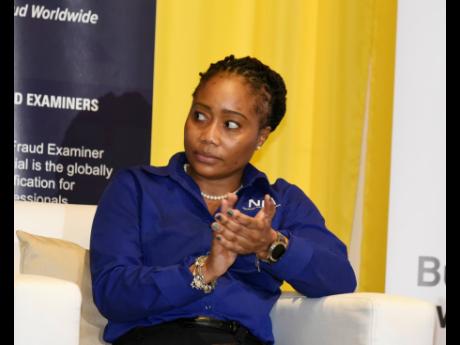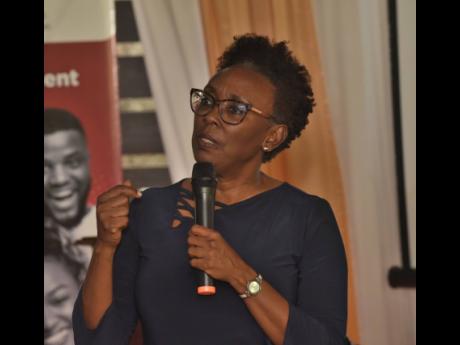Self-serving law caution
... Civil groups defend stance against IC gag clause after committee rejects pleas to change
Mickel Jackson, executive director of Jamaicans for Justice (JFJ), is urging lawmakers to amend legislation that is silencing the Integrity Commission (IC) during probes.
Currently, the IC is the only anti-corruption agency in Jamaica under a legislative gag preventing it from commenting on investigations until a formal report is presented to Parliament.
In fact, the Financial Investigations Division, which probes money laundering and financial crimes, has also recommended to Parliament that the IC be allowed to provide updates on its investigations.
JFJ is concerned that lawmakers may pass laws influenced by personal interests.
“Having listened to some lawmakers, we are concerned that there is potential for self-serving legislation. Laws and their application must be equitable,” Jackson said.
Her comments came in response to a statement by government senator Sherene Golding Campbell during a joint select committee meeting reviewing the Integrity Commission Act (ICA) last week. Golding Campbell expressed that, while civil society organisations had submitted their views, they did not represent all 2.8 million Jamaicans, nor the public officials affected by the ICA. She suggested that the submissions of the groups may not accurately reflect the views of the broader population.
Two other civil society leaders also commented on last week’s joint select committee deliberations, where the lawmakers all signalled that the so-called gag clause in the ICA should not be amended.
UNREALISTIC threshold
Jeanette Calder, executive director of the Jamaica Accountability Meter Portal (JAMP), and Danielle Archer, principal director of National Integrity Action (NIA), both agreed that civil society organisations do not represent the views of all Jamaicans. However, Calder emphasised that they play a crucial role in contributing valuable insights to the legislative process, even without having the endorsement of the entire population.
“If the Parliament were to be guided by the kernel of the senator’s argument, then at no time in Jamaica’s past, present or future would citizens satisfy such a threshold and be able to share their concerns, perspectives and research findings in the legislative process,” Calder said.
Calder also criticised the idea that civil society groups only represent a narrow viewpoint, stating that they often conduct focus group studies and surveys to ensure their contributions reflect a wide range of perspectives. For example, in 2022, JAMP conducted a survey that found 66 per cent of respondents were aware of the IC as an anti-corruption body, and 40 per cent of them were aware of the gag clause. Nearly half of those familiar with the clause supported giving the IC the ability to share information during investigations. Calder said this data was shared with the joint select committee in October 2022.
“Are such views without merit for failing to poll the thoughts of 2.8 million?” she questioned.
At the same time, Archer questioned: “How does the singularly appointed senator propose to hear the voices of the people when those elected received only 21 per cent of the majority vote and altogether only 37 per cent voted for either party? No party can claim to represent the views of all 2.8 million Jamaicans.”
She noted that civil groups consist of individuals who are just as much a part of society as elected and non-elected parliamentarians.
“Therefore, they have the right to express their opinions and have their voices heard,” she added.
Archer also directed a number of questions to the senator. “Does her stance suggest that elected officials only represent the views of those who voted for them and not those who abstained from voting or supported the losing party?
“How does she plan to engage with and understand the opinions of the broader public? Have parliamentarians actively consulted with their constituents and communicated the people’s views? Or have they prioritised their self-interest in their voting decisions?”
The NIA head also wants to know whether parliamentarians “perceive the public as ‘fool fool’, or better yet, uniformed”.
“Have legislators elevated themselves above the people they serve, believing their views to be more important than those of the citizens they are meant to represent?”
Arguing that the gag clause is antithetical to transparency, Jackson said the obvious question that one must ask is: “Who does it serve to have the gag clause remain? Who does it serve to have Section 56(1) remain where routine public information, such as the government contract award database, which had previously been publicly accessible, is now withheld due to the restrictive confidentiality clause? Who is served by these restrictive clauses?”
JFJ has called for a balanced approach that considers both the public interest and the reputational harm of individuals under investigation. Jackson suggested that amendments should include provisions for public announcements of adverse findings only when necessary for advancing an investigation or encouraging witnesses to come forward.
Despite a chorus of calls last week from members of the joint select committee for the retention of the gag clause in the ICA, a key spokesman of the ruling Jamaica Labour Party (JLP) said last Thursday: “ … We trust that at an appropriate juncture, a disclosure will be made by those respective anti-corruption investigating bodies as to the progress of their investigations, and of course, to just confirm to the public that they are, in fact, embarked on a probe”.
Marlon Morgan, a member of the JLP’s communications task force, made these remarks at a press conference addressing allegations that members of the opposition People’s National Party (PNP) are using public funds from the Kingston and St Andrew Municipal Corporation to run its election campaign. It followed a media report which implicated senior PNP members in the alleged misuse of the money, citing WhatsApp conversations.
The PNP has since pushed back against the allegations, calling them “baseless and defamatory”. It also urged the relevant agencies to state whether any investigation is under way into the allegations.



